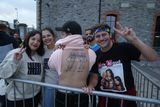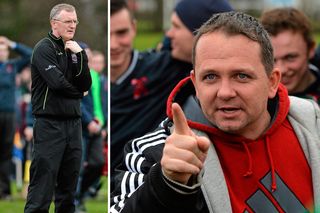Beck: Morning Phase for ex-coolest man on the planet
Beck speaks to Ed Power about the fickle nature of fame, his unconventional childhood and the changing nature of 'cool'

Beck Hansen was once the coolest person on the planet. This is indisputable – for a chunk of the nineties he was a dude among dudes, hipper than Kurt, quirkier than the Britpoppers, more chill than all three Beastie Boys. Or so went the consensus. From where the Loser hitmaker sat the equation wasn't quite as straightforward.
"To be regarded as cool was amusing," he says, smiling wanly (though not without amusement). "I don't think my friends viewed me as very cool. You always have your circle of acquaintances to keep you grounded."
Besides, by the time Beck was anointed hippest of the hip – circa Loser's 1993 release – he had a complicated relationship with 'cool'. If you're in vogue, he explains, sooner or later you're going to be out of vogue – so don't get comfortable.
"The year before they were saying, 'you're the uncoolest guy, you're a sellout – take your polyester pants and go home'. It's like a weather vane – it moves backwards and forwards. I've watched it spin around about a dozen times. I'm not complaining: it's nice having those periods where it feels people are on your side. It helps you create better music."
Beck is the uber-dude no more. Nowadays the brand of cool he embodied – a plaid-shirted Gen X insouciance – is not, as Hansen famously sang, 'Where It's At'. Things have moved on and so has he: his latest album, Morning Phase, is an introspective, deeply beautiful suite of ballads – seventies-flavoured dirges that crackle with the pathos of early middle age (shortly to turn 44, Hansen is married with a son and daughter). Some might consider the LP a downer – it certainly is a universe removed from the indie/hip-hop mash-up Beck pioneered on Loser and subsequent smashes Devil's Haircut, The New Pollution and Sexx Laws (both a tribute to AND critique of Prince style crotch pop).
"There is a difference between melancholic and meditative," says Beck, as it is put to him that Morning Phase has its depressive moments. "Sometimes they can be the same. Not always."
He's been here before – 2002's Sea Change was likewise an acoustic album that pulsed with pain and ennui. On that occasion, he was mourning the end of a long-term relationship (his decade-spanning romance with stylist Leigh Limon). This time? Well, his personal life is just swell. However, he is rumoured to have suffered poor health in the form of a back injury that prevented him touring or recording at length.
"I don't know if the details really matter," he says, softly. "It's probably a little simplistic [to claim the record was inspired by illness] – I'm wary of putting a big catch-all on something. Yeah, I had some injuries, that I have since overcome. How interesting is it ultimately to focus on that? The song is what matters in the end."
It's when Beck spins a line like that – 'the song is what matters' – that he demonstrates his vintage. He's a representative of what is lazily but not inaccurately termed the 'slacker generation' – kids who came of age in the 90s to whom 'selling out' was the ultimate anathema.
Granted, he was never as tortured as Kurt Cobain, or even Pearl Jam's Eddie Vedder, who, it appeared, carried a weird guilt about his band's mainstream success into the 2000s. Still, he is a product of his era. He would never have had the courage to put out a record like Morning Phase early in his career because soul-bearing honesty was at the time frowned upon as cheesy and obvious. He feared the opprobrium of his peers.
"The songs on the new album are simple and personal," he says. "The stuff on earlier releases is more free-wheeling and funny. And it wasn't as if I wasn't writing songs like this back then. What I lacked was the bluster or confidence to share them. In the music scene there was a certain amount of rejection [of earnestness]. It wasn't acceptable.
"Some artists will go and do it and don't care what anyone thinks. I probably felt too vulnerable to plead my case and put down those sort of songs. That was true of a lot of songwriters during that period – even figures like Elliot Smith, coming from somewhere personal. It had to be couched in ... a knowingness. You had to be a pretty bold writer to put your stuff out there and not worry."
For someone historically on the bleeding edge, Beck is surprisingly technophobic. He doesn't have a Facebook page and is not involved with his official Twitter account.
"I haven't paid a lot of attention to it," he says. "I haven't been on Facebook. It's one of those things – like not having an answering machine 20 years ago. You see bands taking selfies back stage ... . It's weird – I toured with my group for a solid ten years and we don't have any pictures. Nobody had a camera – you never thought about taking a picture. Sometimes I wish we did have a few. And yet, in a way, I'm glad we don't. I think the memories are better."
Given its plangent melodies and bittersweet tone, it's tempting to categorise Morning Phase as Beck's 'middle age' record. Hansen doesn't see it that way at all. He has lived, he points out, a peripatetic life and continues to be informed by his drama-infused early years. The singer was born in Los Angeles in 1970, to a Canadian musician father and visual artist mother (a sometime muse to Andy Warhol). His parents lived an unconventional existence and the young Hansen's upbringing could kindly be termed as unusual. Shuttled between extended family, he was allowed greater freedom than a child probably should (at age seven he would regularly travel to downtown LA on his own to catch a movie).
"I had heavier things going on when I was [a child]," he says. "I saw stuff at a young age that were maybe not typical. I find there are always subjects to write about – there are events that happened many years ago which I haven't quit sorting through, trying to make sense of. I don't think there's enough space in a lifetime to make sense of them actually."
He is married to Marissa Ribisi, twin sister of actor Giovanni Ribisi. His wife is a Scientologist as is his father and Beck has spoken of the good works the organisation has, in his opinion, carried out, such as helping the poor and running effective drug rehabilitation programmes. ("When you look at the actual facts and not what's conjured in people's minds – that's all bullshit to me because I've actually seen stuff first hand," he said several years ago).
As his just announced Electric Picnic headline slot attests, Hansen is still a force in alternative rock. However, it is safe to state his profile is nowhere near as electric as in the 90s. With the release of 1996's Odelay, especially, he was on the brink of actual stardom. Does he miss that level of celebrity?
"It's weird – you look back and yeah there was a certain amount of fame. It never tipped over into the stratum where you are in the magazines all the time. There was a brief point it could have. I didn't feel comfortable with that. I put out two or three uncommercial albums in a row – that took care of the fame problem pretty quick."
WHERE THEY AT?
What happened to Beck's 90s peers?
Billy Corgan
The Smashing Pumpkin's frontman called time on the band in the early 2000s, started the disastrous Zwan, then recorded an even more disastrous solo record. He has since reformed the Pumpkins, though he is the only original member.
Courtney Love
Cobain's widow and, later, Corgan's girlfriend, Courtney attempted to reboot her career in 2010 but her solo album was not very well received. Last week she claimed to have found Malaysian Airlines flight MH370 from satellite images.
Beastie Boys
The New York trio owned 1994 courtesy of the body-slamming Sabotage and follow-up LP Licensed To Ill. The future of the group is in the air following the death of Adam Yauch from cancer in 2012.
Sonic Youth
The spiritual fore-fathers of 90s alternative rock Sonic Youth have been on hiatus since it was revealed that husband and wife duo Thurston Moore and Kim Gordon had separated after Moore confessed to an affair. All around the world Gen Xers were stunned – and not a little heartbroken. If Thurston and Kim couldn't make it, what hope for the rest of us?
Join the Irish Independent WhatsApp channel
Stay up to date with all the latest news















